Society Biennial Book Prize
The Society awards a biennial book prize of £500 to encourage original research on any aspect in the field of Renaissance studies and to recognise significant accomplishments by members of the SRS.
The SRS Book Prize for the year 2024 will be awarded to the author of the best monograph in Renaissance Studies published (digital/hard copy) between 1 January 2022 and 31 December 2023. To be eligible the monograph must be written in English by a current member of the SRS. The prize will be awarded for a book with a topic where the majority of material is within the chronological period 1300-1700. Books about Renaissance history, art, architecture, philosophy, science, technology, medicine, religion, music, the literatures and languages of Europe, and of the countries in contact with Europe during the Renaissance, are eligible. Books will be judged on the following criteria:
- contribution to Renaissance Studies;
- quality and originality of research;
- clarity and eloquence;
- thoroughness and accuracy in documentation;
- methodological skill and/or innovation.
Please send three hard copies of the book to the chair of the book prize committee:
Professor Fabrizio Nevola
Chair of Art History and Visual Culture
Department, Languages, Cultures and Visual Studies
Faculty of Humanities and Social Sciences
University of Exeter
Old Library
Exeter EX4 4SB
Email: f.nevola@exeter.ac.uk
The deadline for receipt of submissions is 31st January 2024.
An announcement of the award will be published in the Society’s Bulletin as well as on the SRS website.
Previous Winners
The SRS is delighted to announce the Biennial Book Prize 2024 goes to Carla Roth for Talk of the Town: Information and Community in Sixteenth-Century Switzerland (Oxford: Oxford University Press, Past and Present Book Series 2022).
The winner was announced at an online award ceremony, hosted by Ellie Chan and John Gallagher, which featured pre-recorded videos from each of the authors of the shortlisted books. Comments from the judges and the videos are available to watch below.
We would like to extend our congratulations to all who were shortlisted for their excellent books and invigorating books. Although it is commonplace for judges to say, this was a very difficult decision to reach. We had almost 50 submitted books and identifying a shortlist of five was no mean feat.
We were very impressed by all five of these books, each of them so different from one each other, but all of them attesting to vibrant and innovative approaches to the broad field of Renaissance Studies. The cross section of the field that they collectively offer should make us all feel positive about the future of Renaissance Studies and the potential for fresh insights and perspectives.
Reading for the SRS book prize gives us a sense of what it is to write an academic monograph today, and the range of ways that authors tackle the challenge. All five of these books cross disciplinary boundaries in different ways, offering bold new readings of both established and more overlooked topics. We were especially struck by the range of authorial voices we encountered – in itself a measure of how readers’ expectations can be confounded and scholarly conventions have become more flexible. All the books make significant new contributions, many extend traditional disciplinary boundaries, and all have something original to say.
Winner
Carla Roth, The Talk of the Town: Information and Community in Sixteenth-Century Switzerland (Oxford University Press, The Past and Present Book Series, 2022)
Carla Roth’s book creeps up on you. Focusing on the network of an educated linen trader from St Gall, and interrogating a rich source of personal notebooks kept over a number of decades, Roth teases out relationships 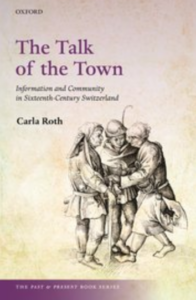 through the circulation of news, and the close reading of reported social interactions from gossip to jokes, from distant news to local events. We were really struck by the care and attention given to revealing the local and wider implications of a microstudy of place, and the commitment to sources and the people’s lives they are an account of that draws in the reader at every step. Innovative approaches are worn lightly – a digital analysis of the network is illuminating but doesn’t even take over the chapter in which it appears – and yet as the book progresses, so we become more invested in the everyday lives of Johannes Rütiner and his circle. This book is a model of scholarship. Understated yet ambitious, it offers a wholly original account through a close reading of a set of personal notebooks, used as a window into a community and its connections to the wider early modern world. This engagingly written and thoroughly researched study is a demonstration of the historian’s craft at its best.
through the circulation of news, and the close reading of reported social interactions from gossip to jokes, from distant news to local events. We were really struck by the care and attention given to revealing the local and wider implications of a microstudy of place, and the commitment to sources and the people’s lives they are an account of that draws in the reader at every step. Innovative approaches are worn lightly – a digital analysis of the network is illuminating but doesn’t even take over the chapter in which it appears – and yet as the book progresses, so we become more invested in the everyday lives of Johannes Rütiner and his circle. This book is a model of scholarship. Understated yet ambitious, it offers a wholly original account through a close reading of a set of personal notebooks, used as a window into a community and its connections to the wider early modern world. This engagingly written and thoroughly researched study is a demonstration of the historian’s craft at its best.
The SRS is delighted to announce the Biennial Book Prize 2022 goes to Suzanna Ivanič for Cosmos and Materiality in Early Modern Prague (Oxford: Oxford University Press, 2021). In an exceptionally strong field, Sarah Bendall and John Christopoulos were highly commended for their Shaping Femininity: Foundation Garments, the Body, and Women in Early Modern England (London: Bloomsbury, 2021) and Abortion in Early Modern Italy (Cambridge, MA: Harvard University Press, 2021) respectively.
The winner was announced at an online award ceremony, hosted by Nandini Das and John Gallagher with Jane Grogan, which featured pre-recorded videos from each of the authors of the shortlisted books. Comments from the judges and the videos are available to watch here.
We would like to extend our congratulations to all who were shortlisted for their excellent books.
Winner
Suzanna Ivanič, Cosmos and Materiality in Early Modern Prague (Oxford: Oxford University Press, 2021)
From the wolf and lynx teeth found in a set of prayer beads, with a Lutheran sermon book in a sixteenth century burgher’s house in Prague, this jewel of a book sketches in a rich material environment in which Catholic and Lutheran customs happily co-existed alongside a range of popular religious practices, often within the same  households. Making compelling use of objects, inventories, texts, and the natural matter within them, Ivanič challenges dichotomous understandings of confessional division in a century of religious upheaval. The complexity of personal devotion emerges, experienced within a cosmos shaped by the physical, social and the spiritual, in which individuals escaped confessional straitjackets to negotiate their own relationship with the divine. Its engagingly evidenced micro-histories of multi-confessional Prague and its clockmakers, butchers, and other burghers are triumphs in their own right. Yet Ivanič’s arguments and the convincing insight of her material lens also hold profound and lasting implications for our understanding of religious and social change throughout Europe.
households. Making compelling use of objects, inventories, texts, and the natural matter within them, Ivanič challenges dichotomous understandings of confessional division in a century of religious upheaval. The complexity of personal devotion emerges, experienced within a cosmos shaped by the physical, social and the spiritual, in which individuals escaped confessional straitjackets to negotiate their own relationship with the divine. Its engagingly evidenced micro-histories of multi-confessional Prague and its clockmakers, butchers, and other burghers are triumphs in their own right. Yet Ivanič’s arguments and the convincing insight of her material lens also hold profound and lasting implications for our understanding of religious and social change throughout Europe.
Highly Commended
Sarah Bendall, Shaping Femininity: Foundation Garments, the Body, and Women in Early Modern England (London: Bloomsbury, 2021)
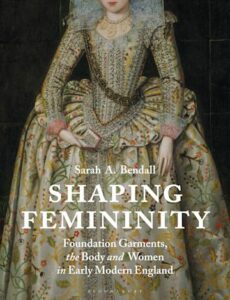 Research in practice has become a desirable goal for many working in the Humanities but rarely can it have been carried out with as much dedication, skill, and panache as in Sarah Bendell’s impressive Shaping Femininity. Virtually nothing is known about early modern undergarments, although they were clearly worn by (nearly) everyone. Moving beyond surviving inventories, images and objects, Bendell reconstructed her own garments in order to understand how they shaped the female body The result is a fascinating exploration of a – literally – disguised history, one that shows how female agency shaped and defined notions of femininity alongside the male gaze. Shaping Femininity not only offers a substantial contribution to gender history, it also documents a thrilling research journey.
Research in practice has become a desirable goal for many working in the Humanities but rarely can it have been carried out with as much dedication, skill, and panache as in Sarah Bendell’s impressive Shaping Femininity. Virtually nothing is known about early modern undergarments, although they were clearly worn by (nearly) everyone. Moving beyond surviving inventories, images and objects, Bendell reconstructed her own garments in order to understand how they shaped the female body The result is a fascinating exploration of a – literally – disguised history, one that shows how female agency shaped and defined notions of femininity alongside the male gaze. Shaping Femininity not only offers a substantial contribution to gender history, it also documents a thrilling research journey.
John Christopoulos, Abortion in Early Modern Italy (Cambridge, MA: Harvard University Press, 2021)
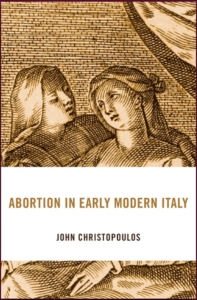 ‘In sixteenth- and seventeenth-century Italy, women procured abortions and had them forced upon them.’ From this unequivocal opening line onwards, Abortion in Early Modern Italy is a triumph of sensitive yet clear-eyed storytelling, on a topic that remains emotive and relevant today. Much of what Christopoulos reveals is unexpected. Drawing on archival evidence from across the peninsula, he shows that men were often the primary beneficiaries of abortion, and that the ambiguities of women’s bodies were not only a source of anxiety during pregnancy but also created a space for regulating reproduction, even or especially in Counter-Reformation Italy. There are ironies as well. Medical advice on avoiding miscarriages inadvertently taught women and men on how to encourage them. Punishments might be severe, but the state of medical knowledge and burden of proof made abortion an un-provable crime. Finally, Abortion in Early Modern Italy also implies that scientific advances are not necessarily a panacea for societal issues.
‘In sixteenth- and seventeenth-century Italy, women procured abortions and had them forced upon them.’ From this unequivocal opening line onwards, Abortion in Early Modern Italy is a triumph of sensitive yet clear-eyed storytelling, on a topic that remains emotive and relevant today. Much of what Christopoulos reveals is unexpected. Drawing on archival evidence from across the peninsula, he shows that men were often the primary beneficiaries of abortion, and that the ambiguities of women’s bodies were not only a source of anxiety during pregnancy but also created a space for regulating reproduction, even or especially in Counter-Reformation Italy. There are ironies as well. Medical advice on avoiding miscarriages inadvertently taught women and men on how to encourage them. Punishments might be severe, but the state of medical knowledge and burden of proof made abortion an un-provable crime. Finally, Abortion in Early Modern Italy also implies that scientific advances are not necessarily a panacea for societal issues.
The SRS book prize 2020 has been awarded to Hannah Murphy for A New Order of Medicine: The Rise of Physicians in Reformation Nuremberg (University of Pittsburgh Press, 2019). An honourable mention was given to Abigail Brundin, Deborah Howard, & Mary Laven, The Sacred Home in Renaissance Italy (Oxford University Press, 2018). The judges thank the publishers for sending copies of the books: they received over forty book this year and, as ever, the standard was extremely high and underscores the vibrancy of our field.
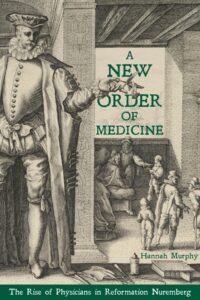 Hannah Murphy’s A New Order of Medicine: The Rise of Physicians in Reformation Nuremberg is an exemplary work of scholarship – of history, of intellectual history, of history of medicine – and a model of outstanding scholarly writing. We are delighted to award it the SRS Book Prize. The title is a little dry, perhaps, but in stark contrast to its contents. Physicians, apothecaries, scholars and their families traverse its pages, as Murphy pursues what she describes as ‘the multiplicity of paths that physicians could take to deal with the challenges provided by medicine … [often] carried out within the confines of Galenism rather than in opposition to it’ (p. 96). Thoroughly researched, meticulously supported with a wealth of primary evidence and secondary sources, its alertness to changes in the social and political spheres as much as the medical is a real strength.
Hannah Murphy’s A New Order of Medicine: The Rise of Physicians in Reformation Nuremberg is an exemplary work of scholarship – of history, of intellectual history, of history of medicine – and a model of outstanding scholarly writing. We are delighted to award it the SRS Book Prize. The title is a little dry, perhaps, but in stark contrast to its contents. Physicians, apothecaries, scholars and their families traverse its pages, as Murphy pursues what she describes as ‘the multiplicity of paths that physicians could take to deal with the challenges provided by medicine … [often] carried out within the confines of Galenism rather than in opposition to it’ (p. 96). Thoroughly researched, meticulously supported with a wealth of primary evidence and secondary sources, its alertness to changes in the social and political spheres as much as the medical is a real strength.
Consistently engaging, concise and incisive, it is full of subtle insight and rigorous analysis, and manages to keep surprising and delighting the reader with the story it has to tell. The judges found it unanimously compelling, engaging and persuasive in its account of changes in medical practice and regulation in a sixteenth-century city of the Holy Roman Empire.
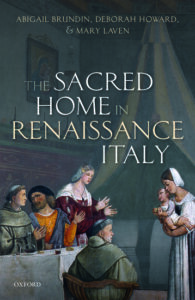 The Sacred Home in Renaissance Italy, co-authored by Abigail Brundin, Deborah Howard and Mary Laven, is a powerful testament to the possibilities of scholarly co-authorship. The rich and comprehensive survey of domestic piety in Renaissance Italy that the authors produce is one that has (and will) have a big impact on the field. The judges were particularly impressed by its successful interweaving of material history, textual history, women’s history, art history (of course) and literary approaches to produce a new and necessary perspective on the everyday practices and values of Italian Renaissance life. Among its strengths are the clarity and resilience of its overall conceptualization and chosen methodologies, the focus on rural as well as urban life, the impressive integration of gender into the primary work of the book without making it a ‘special-interest’ focus. We are very pleased to award it an Honourable Mention in the 2020 Society for Renaissance Studies Book Prize.
The Sacred Home in Renaissance Italy, co-authored by Abigail Brundin, Deborah Howard and Mary Laven, is a powerful testament to the possibilities of scholarly co-authorship. The rich and comprehensive survey of domestic piety in Renaissance Italy that the authors produce is one that has (and will) have a big impact on the field. The judges were particularly impressed by its successful interweaving of material history, textual history, women’s history, art history (of course) and literary approaches to produce a new and necessary perspective on the everyday practices and values of Italian Renaissance life. Among its strengths are the clarity and resilience of its overall conceptualization and chosen methodologies, the focus on rural as well as urban life, the impressive integration of gender into the primary work of the book without making it a ‘special-interest’ focus. We are very pleased to award it an Honourable Mention in the 2020 Society for Renaissance Studies Book Prize.
The 2018 SRS book prize was awarded to Katherine Ibbett for her Compassion's Edge: Fellow-Feeling and its limits in Early Modern France (University of Pennsylvania Press, 2017). One further book was highly commended, Susanna Berger, The Art of Philosophy: Visual Thinking in Europe from the late Renaissance to the early Enlightenment (Princeton University Press, 2017).
As ever, the judges were impressed by the high standard of the books entered for the prize and choosing a winner was extremely difficult. The judges are very grateful to all the publishers who sent in their books to the committee.
Dr Berger's book was singled out by all three judges as a visually stunning volume, which considers the interplay between philosophy, ways of thinking and visual representation with lucidity and ambition. Susanna Berger draws attention to the engraved plural images and tableaux which illustrated philosophical works as expressions of key concepts, as well as the role played by art in the development of ideas, both of which constituted 'visual thinking'. A wide range of source material is used to great effect - including student lecture notebooks, friendship albums, printed books and broadsides.
Professor Ibbett's book was, however, the unanimous winner because of its brilliant interdisciplinary range and relevance. Katherine Ibbett provides an illuminating and sophisticated discussion of the meaning and limits of compassion in France between the Edict of Nantes in 1589 and its Revocation in 1685. She traces the divisions and separations which were invoked by compassion in this original work, which is both reflective and rigorous. She illustrates vividly that compassion was one way in which social dynamics of inclusion and exclusion could be expressed and reinforced. Through a focus on the feeling, rather than on charitable activities presumed to be motivated by such a sentiment, she provides a new interpretation of how early modern communities negotiated the difficult terrain of toleration and co-existence in the aftermath of Europe's Reformations. Looking in particular through the lens of gender, she provides a fresh interpretation of a wide variety of texts (including plays, pamphlets, novels, dictionaries and moral philosophy). This book promises to inspire fresh scholarship in early modern French history, the history of emotions and Renaissance Studies.
The 2016 SRS book prize was awarded to Kate van Orden for her Materialities: Books, Readers and the Chanson in Sixteenth Century Europe (OUP, 2015). One further book was highly commended, Helmer Helmers, The Royalist Republic: Literature, Politics and Religion in the Anglo-Dutch Public Sphere (CUP, 2015).
As ever, the judges were impressed by the high standard of the books entered for the prize and choosing a winner was extremely difficult. The judges are very grateful to all the publishers who sent in their books to the committee.
Dr Helmers's book was singled out by all three judges because of its consideration of mid-seventeenth century Anglo-Dutch politics. Helmer Helmers studies how the continent responded to the Civil War in England and what made the Dutch Republic sympathetic to the royalist cause. This is an unusal an illuminating approach and Helmers offersn insightful analysis through a meticulous attention to a variety of Dutch sources, ranging from engravings, songs, ballads, estate poetry, revenge tragedies todemonology tracts. The breadth and orginiality of the study meant it was worthy of commendation.
Professor van Orden's book was, however, the unanimous winner. All the judges commented with admiration on its interdisciplinary approach to the study of sixteenth century songbooks. The book argues that the bibliographical features of French part songbooks show the sociability at the centre of early modern singing. The chanson culture was a carrier of relationships. Singing part songs at home helped family and friends learn to read texts, music, and at the same time, places in society. Here are printed and manuscript part-books, catechisms, civility handbooks and musicology treatises to let us hear the soundscape of the home. But this is not only a history of relationships, it is also a chance to share the singers’ delight in the world of music. We always read books but we don’t often hear them; the originality of van Orden’s text lies in making us realize that. It is a significant book because it brings together book history and the physical and mental activities of reading music and words. Its argument is supple, its approach scholarly, and its style incisive., showing us how performance shares out the creative process between singers, players and the texts in front of them.
The 2014 SRS book prize was awarded to Alec Ryrie for his book, Being Protestant in Reformation Britain (OUP, 2013). Two other books were highly commended, Guido Alfani, Calamaties and the Economy in Renaissance Italy: The Grand Tour of the Horsemen of the Apocalypse, trans. Christine Calvert (Palgrave, 2013), and Sharon Gregory, Vasari and the Renaissance Print (Ashgate, 2012).
The judges were impressed by the high standard of the books entered for the prize and were extremely grateful to all the many publishers who sent in their books to the committee making the decision of choosing a winner extremely difficult.
Professor Gregory's book was singled out by all three judges because of its comprehensive nature and painstaking research in making available for a wide readership all the prints associated with Giorgio Vasari, and for providing a fascianting commentary that explains why they were so central to his thinking and artisitic practices. The book is the product of many years of serious scholarship and is exactly the sort of work that justifies what academics do in opening up the archive for others to understand and use and which makes being part of the profession a pleasure. The committee also wishes to congratulate the publishers for producing such high quality images.
Professor Alfani's book was chose because it is a comprehensive and stimulating study of the disasters that ravaged Europe in the sixteenth century: death, war, plague, and famine. All the judges agreed that this was a work of admirable ambition, a big ideas book that will inspire readers to further research, and which has a relevance for anyone working on the darker aspects of the Renaissance. The work has a command of an extremely wide range of sources and disciplines, encompassing population history, military history and medical history and is never short of insight into the misery that Europeans experienced throughout the continent in the eraly modern period.
Professor Ryrie's book was, however, the unanimous winner. All the judges commented with admiration on its ability to combine serious ideas and a breadth of vision with meticulous attention to detail. The book asks a simple, central question that is of interest to anyone working in this period: what did it feel like to be a Protestant immediately after the Reformation? From this follow a series of other questions that structure the book: How did you have to change your thinking? What forms of worship did you feel you could adopt? How might you have thought of your Catholic neighbours and your ancestors? What did it feel like to learn that you could talk directly to God without the intervention of the church? How did you read? What was the household in which you lived like? Being Protestant in Reformation England is a long book but it never feels unduly prolix. Its wealth of insights into early modern British life - and, by analogy, European religion - make it a worthy winner of the 2nd. SRS book prize.
Jan van Naaldwijk’s Chronicles of Holland: Continuity and Transformation in the Historical Tradition of Holland during the Early Sixteenth Century, a study of the late medieval historical traditions of Holland and their continuations in the early modern period.
